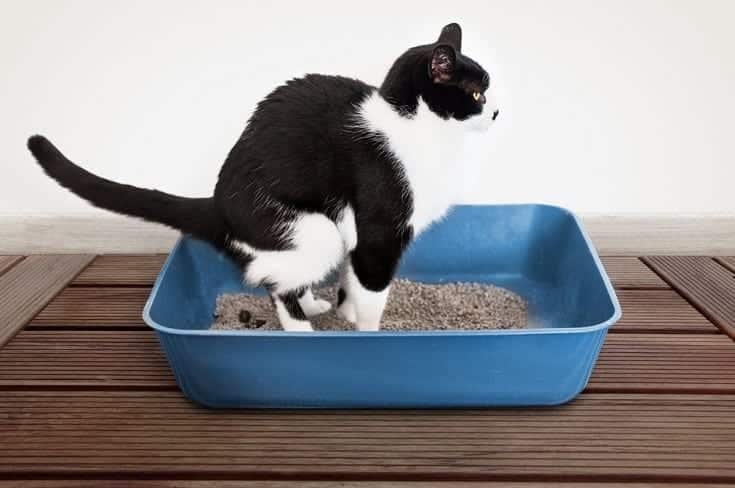Monitoring your cat’s poops is one way to do a quick audit of their health. You have probably noticed that poop questions will frequently be asked by your veterinarian during a checkup. Regular bowel movements are a clear indication that your cat is eating and that the gut is healthy enough to pass waste out.
Drastic changes in the poop schedule can indicate a clinical problem and it may be advisable to book a veterinary appointment. Read on to learn more about what to do if your cat is suddenly pooping more than usual or changing her poop routine.

How Many Times a Day Should a Cat Poop?
For kittens
A young kitten that is growing quickly can be expected to use the litter box for poop up to five times per day. At this stage, there are a lot of changes occurring in the gut and a quickly growing kitten will be eating a lot to keep up with their fast growth. The frequency of defecation (pooping) will generally decrease as your kitten ages but should never be less frequent than once in 48 hours.
If your kitten is pooping more frequently than 6 times per day, you may want to book an appointment with your veterinarian to ensure that there are no underlying health conditions. A number of bacterial, viral, and parasitic infections that are common in kittens can lead to changes in the defecation schedule. Your veterinarian will be able to give a full assessment of your cat’s health and screen for potential illnesses.
For adults & seniors
Adults and senior cats will normally poop 1–2 times per day, on average. More than twice per day can be a cause for concern and you should contact your veterinarian. Similarly, if your cat has not pooped for 48 hours it may be a cause for concern. Senior cats may be at higher risk for gut illness and dysfunction because of their age.
Why is My Cat Pooping More than Usual?
If your cat has access to the outdoors, you may not be able to track her pooping schedule very closely. These cats will commonly choose a hidden spot in a garden or flower bed as their toilet. Understandably, it can be concerning if you have to start cleaning out the litter box more frequently than usual.
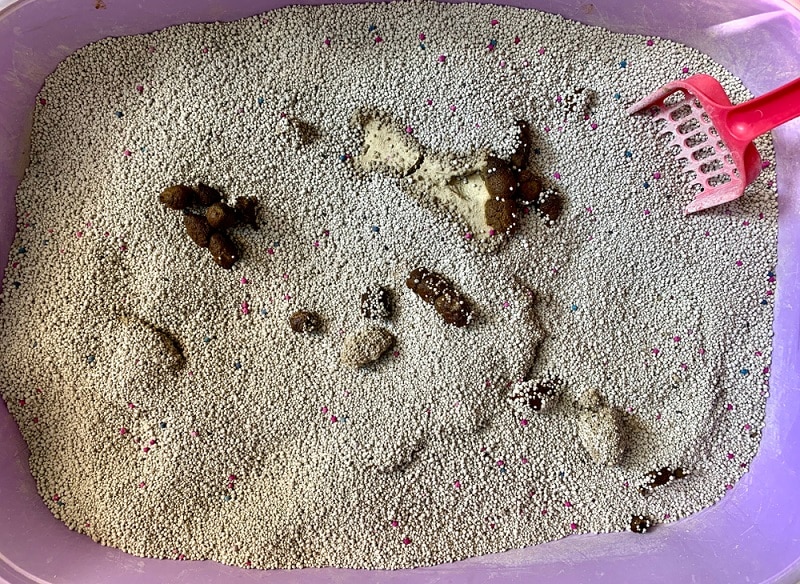
As long as it isn’t more often than 1–2 times every day, your cat has probably just chosen to change her preferred toileting spot to inside. Heavy rain or a bitter wind can make a temperature-controlled, dry litter box far more tempting for poop duty. Similarly, an indoor litter box may be preferred if your kitty finds that her favorite outdoor toilet spot has been claimed by another cat in the neighborhood.
Another reason for changes in the poo schedule is a change in the diet. Foods that are less digestible will produce more waste to have to come out of the back end. For instance, foods that are marketed as “hairball reducing” may have higher levels of indigestible insoluble fiber. Examples of insoluble fiber ingredients include cellulose and beet pulp. They help keep things moving in the gut to encourage hairballs to move through the gut rather than be vomited up on the new rug.
Should I Take My Cat to The Vet for Pooping Too Much?
If your cat is pooping more frequently than twice per day, it is worth having a look at the full picture to get an idea of what might be wrong and if a veterinary appointment is needed. A nicely formed poop will be firm and log-shaped—take a look at the Fecal Scoring Chart to see whether your cat’s poos are normal.
Soft poos or watery diarrhea is a sign of gut troubles that should be addressed by a veterinarian. If you see bright red blood or the feces become tarry in color, there is likely to be intestinal bleeding present which must be assessed by a vet as soon as possible.
Litter Box Woes
A cat may change her pooping habits even due to subtle changes in her home environment. A change in the litter box location or litter type might discourage a cat from using her box. It may lead to a few accidents on the floor until she gets used to the new setup. An unwelcome change can also cause some cats to stop burying their poop. This could be something as seemingly insignificant as meeting a new person or a reorganization of the furniture. Even these small upsets can bother a sensitive kitty enough to change her toileting behaviors.
Even the best cat litter can quickly start smelling bad. To avoid the expense and inconvenience of constantly replacing your litter, you can try a great litter additive like Hepper's Advanced Bio-Enzyme Cat Litter Deodorizer, a natural product that uses bio-enzymes to neutralize odors.
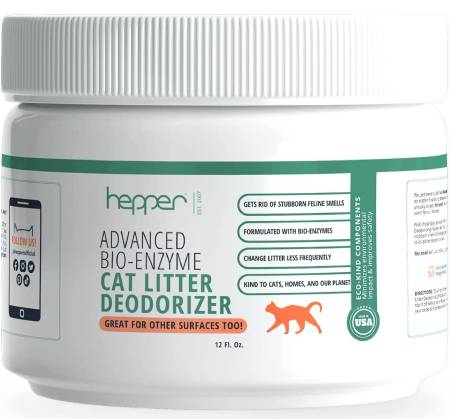
This deodorizer works on all types of litter and won't disrupt your cat's litter box habits.
At Catster, we’ve admired Hepper for many years and decided to take a controlling ownership interest so that we could benefit from the outstanding designs of this cool cat company!
After-Surgery Recovery
- Your cat will have been fasted prior to the surgery
- Your cat may have been too nervous to eat her regular potion sizes while in the hospital
- Administered medication may decrease gastrointestinal motility
This can occur even after a routine surgery such as a neuter or spay procedure. Your veterinarian will be able to confirm what to expect in terms of toileting and when the regular schedule is expected to resume.
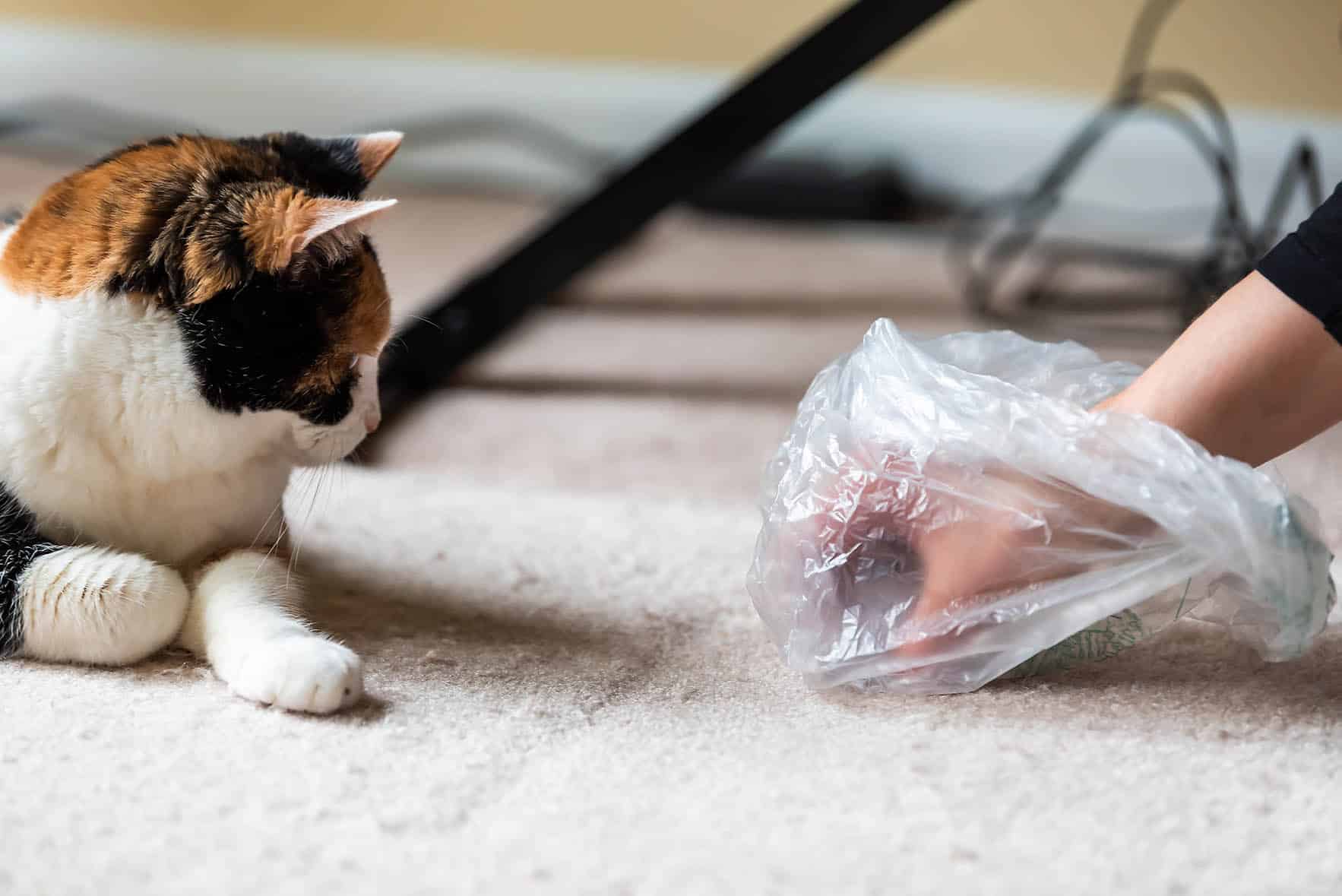
Over-grooming & Scooting
Excessive grooming of the rear end can also be a sign of a problem. You may catch your cat repeatedly liking her back end or find irritation of the skin in the area. Along with this, you may find your cat dragging her back end along the ground. This is referred to as “scooting”. It is normally in response to something being stuck to their bottom or a strong itch.
If scooting behavior does not stop after a few days, your veterinarian should check your cat’s anal glands for impaction. Anal glands are small liquid-filled sacs that normally empty regularly with the passing of feces. Any disruptions in poop schedules or poop consistency bring the risk that they may not empty naturally and become overfilled. A veterinarian can safely express anal glands and quickly bring relief to a scooting cat.
Firm stools
Firm stools are uncomfortable and can lead to constipation. You may see your cat straining in the litter box and licking her hind end if she is struggling with passing a bowel movement. If this continues for over 24 hours, medical treatment is advised. A veterinarian may administer a laxative or stool softener to help to get things moving. In rare cases, cats may have to be hospitalized for some time for long-term treatment.
- Please note that male cats that appear to be constipated may have a blocked urethra, which is an emergency. If you are unsure, you should head to the vets for assessment immediately.
Smelly poops
An especially smelly poop is an unwelcome surprise, but it isn’t necessarily a sign of concern on its own. Most commonly, they indicate mild upsets in the gut which can arise because of changes in the diet. If your cat is stinking up her litter box more regularly, be on the lookout for other symptoms which indicate a health concern.
What is Causing My Cat’s Poop Problems?
Food reaction & allergies
A food reaction or allergy can cause gastrointestinal abnormalities which lead to changes in toileting habits and poop consistency. A diagnosis can be made using a veterinary-supervised elimination diet trial. For the trial, your cat will switch to a clinical diet which has a very low likelihood of triggering any allergic response. After 8 weeks, single ingredients are re-introduced to the diet to determine which one is causing the reaction.
Parasites
To check for gastrointestinal parasites, your veterinarian will process a fresh poop sample from your cat for microscopic investigation. Under the microscope, the eggs of any unwanted gut hosts will be visible and can be identified for treatment. The treatment of gut parasites can be through the use of oral or spot-on medication. Your veterinarian may want to look at preventive plan options as parasites can be quite uncomfortable to your cat and damaging to their health.
Inflammatory Bowel Disease (IBD)
IBD can cause many changes in your cat’s gut. It is a complex disease that can involve more than one body system. Your veterinarian may have to go through a few diagnostics before confirming a diagnosis. Because of the many factors that can be associated with IBD, your veterinarian will be able to come up with a treatment plan that is best suited to your individual cat.
Diabetes
A cat with diabetes will be at risk of constipation. Your veterinarian can confirm a diagnosis of feline diabetes by checking your cat’s blood glucose level and urine glucose level. Treatment of diabetes involves very close regulation of your cat’s blood glucose using insulin administration and a closely-monitored diet.
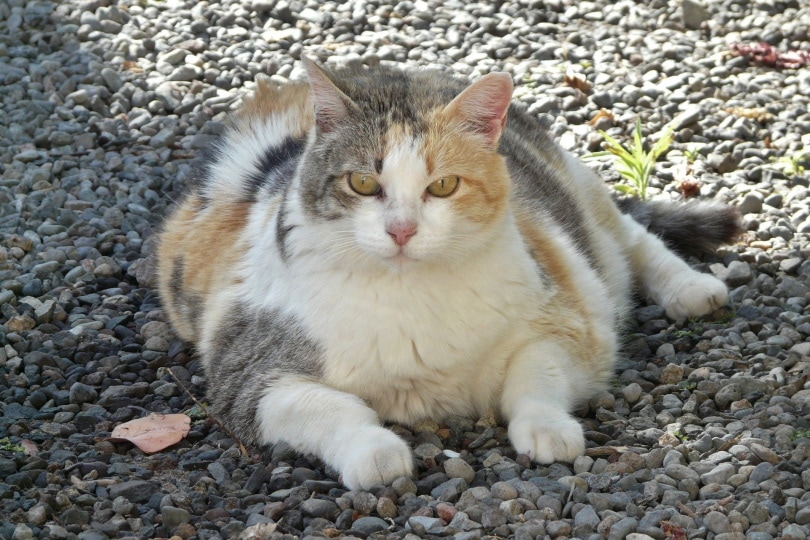
Kidney disease
Like diabetes, kidney disease causes dehydration, which can result in constipation. If you notice your cat’s poop is small and hard, and they’re drinking more or urinating more, it’s possible that renal failure is the cause. Talk to your vet, who will be able to investigate.
Hyperthyroidism
Hyperthyroidism will also predispose cats to constipation. This can usually be diagnosed using a blood test. There are four main options for treatment: surgery, medication, radioactive therapy, or long-term feeding of a clinical diet. A veterinarian can outline the advantages of each and help to decide which is best for each individual situation.
Megacolon
A cat with megacolon will no longer be able to pass feces. This can happen due to physical obstruction of the gut or a decrease in the motility of the gut. A veterinarian can diagnose megacolon with the use of x-ray imaging. The initial line of treatment includes the use of enemas and oral laxatives. Serious cases may have to be dealt with surgically.

What Should You Feed a Cat Who is Pooping Too Much?
Choosing the right diet can potentially help a cat who poops too much. If you are looking to switch your cat’s regular diet, ensure to check with your veterinarian if there are any ongoing medical conditions. Another thing to keep in mind is to always choose food with an adequacy statement on the bag. The diet should be “complete and balanced” to ensure that it will provide all the nutrients your cat needs. With that in mind, read on for some guidelines to follow to pick out a diet for a cat with a too-frequent poop schedule.
Choose a diet with a higher digestibility
A highly digestible diet will be well-absorbed in the gut and will leave less waste to come out of the back end. Unfortunately, it is challenging to determine which diets are truly the most digestible without testing them out first! One guideline to keep in mind is that diets that are lower in fiber will tend to be more digestible. You can find the fiber content of your cat’s food listed on the label or contact the manufacturer for more information.
Choose a diet with prebiotics
Prebiotics are ingredients that feed the “friendly bacteria” of the gut. Some examples of ingredients that contain prebiotics are apples, cranberries, and carrots. You will find these listed on your cat’s food label or can call to confirm prebiotic sources with the manufacturer.
Remember, these ingredients will have been incorporated into the canned or kibble diet in a balanced way to ensure the food is still tasty and provides all the required essential nutrients. Always check with your veterinarian before trying to increase the prebiotic content of your cat’s food yourself, as you can unbalance their diet.
Choose a diet that is suitable for a cat with a food reaction
A diet that is suitable for a potential dietary allergy or food reaction will avoid the use of any ingredients your cat has encountered previously. This is especially true when it comes to the main protein source. Dietary allergies will be triggered by a specific protein in a food. If it is difficult to find a food with a completely novel protein source, the best choice for a suspected food allergy will be a hydrolyzed protein diet. These foods will have their proteins broken up into smaller bits so that your cat can get the nutrients she needs with a greatly reduced risk of reaction.
Final Thoughts
If you’ve noticed that your cat is pooping more frequently, it is likely that you will pick up on other subtle changes that can indicate a health concern. As long as you keep monitoring your cat closely and know when to go to the vet, you can be sure that any poop problems will be dealt with quickly!
Want more free vet advice? Check out some of our other Ask-a-Vet posts:
- Why Is My Cat Throwing Up Undigested Food? (Vet Answer)
- My Cat’s Nose is Dry: Is This Normal? (Vet Answer)
Featured Image Credit: Stefano Garau, Shutterstock
- 1 How Many Times a Day Should a Cat Poop?
- 2 Why is My Cat Pooping More than Usual?
- 3 Should I Take My Cat to The Vet for Pooping Too Much?
- 4 What Other Poop-related Problems Should I Look Out for?
- 5 What is Causing My Cat’s Poop Problems?
- 6 What Should You Feed a Cat Who is Pooping Too Much?
- 7 Final Thoughts

